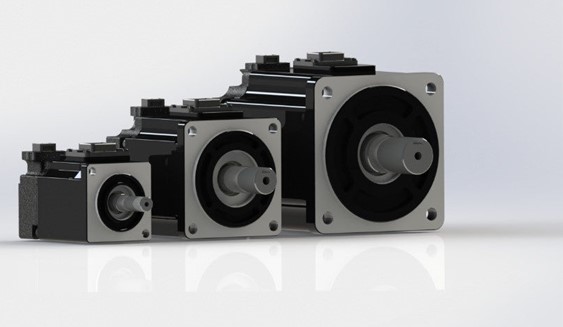
Battery-less magnetic encoders have been added as a key feature in a new series of AC servo motors from Nidec Instruments. Manufactured in-house, the absolute encoders eliminate the need for a backup battery to enable memorization of location.
The Nidec Corporation subsidiary introduced the S-Flag Dynamic Motion MB series in March as a new mass-produced line that represents a re-design of one of its hallmark industrial motors. The S-Flag models were originally launched in 2014 as an upgraded version of AC servo motors that the company manufactured for its transfer robots. They advanced to be used for general-purpose products for industrial equipment and were further improved S-Flag motors in 2019.
In the new version, Nidec engineers made design improvements for high accuracy, high output and high-speed motions especially to meet the robot market’s requirements. A key element is inclusion of the battery-less, magnetic absolute encoder with a resolution of 23 bits, which can withstand a harsh production environment.
Some markets and applications are witnessing increasing demands for absolute encoders, which continue to memorize the locations of devices even when they are switched off. The conventional method for encoders to memorize location information has been to connect a backup battery to an encoder. However, amid a rising need to reduce maintenance load on batteries in recent years, Nidec has adopted battery-less encoders.
The Nidec engineers made other improvements, too. With their rated peak torque enhanced from the usual 300% to 350%, the new motors have had their cogging torque reduced from the rated torque ratio of 3% to 1.5% to enable more precise movements. While the models’ maximum rotating speed has been improved from the existing standard of 6,000r/min. to 7,000r/min., their water- and dust-resistance properties were increased from the existing IP65 to IP67 to fulfill diverse requirements.
AC servo motors typically utilize permanent magnets, often made of rare earth materials, on their rotors to achieve high torque and precise control. In developing the new motors, said the company, engineers at Nidec Instruments utilized its AC servo-related knowledge, together with the Nidec Group’s technologies such as Nidec Corporation’s motor magnetic circuit design and high-speed computer-based optimized calculation technologies. For more info, see www.nidec.com.



